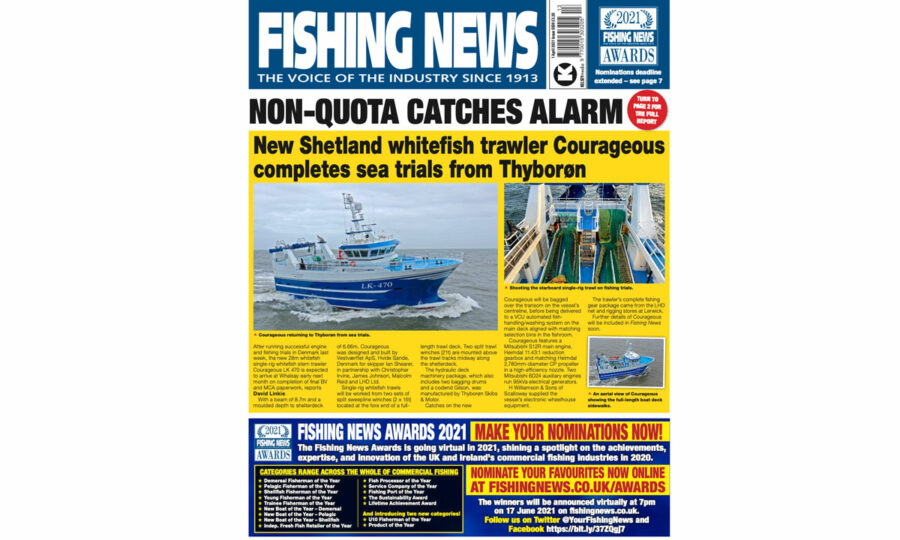Little data on valuable catches in UK and EU waters
There is growing concern in the industry that EU boats are catching large amounts of non-quota species in UK waters which are not being recorded, and that the vessels are not being inspected, reports Tim Oliver.
Quantities of non-quota catches by both UK and EU vessels are now limited by track records of catches in the 2012-2016 reference period.
A growing fleet of Dutch and Danish fly-draggers, as well as other vessels, are targeting valuable non-quota species in both the eastern and western Channel, with no inspections to check whether they are complying with their allowances.
There are also fears that UK catches of non-quota species in EU waters will be reduced because they are now based on catch track records following Brexit.
Questioned about EU catches of non-quota species in UK waters, fisheries minister Victoria Prentis said the MMO uses data published by the EU Commission to estimate EU landings from UK waters.
“The MMO does not hold comprehensive, historical records of activities by EU vessels, as these are held by their flag state,” she said.
Estimated average yearly landings of all non-quota species caught by EU vessels in the English EEZ and territorial waters (six to 12-mile zone) between 2012 and 2016 were 24,995t.
Jerry Percy, director of NUTFA, asked why only estimates could be given for non-quota catches between 2012 and 2016, and pointed out that criteria for EU vessel track records of fishing for non-quota species in the Brexit Trade and Co-operation Agreement (TCA) within the overall UK EEZ were different to those permitting access to the six to 12-mile zone.
He said he had received a number of calls from fishermen ‘complaining bitterly’ about the increasing numbers of fly-shooters operating in both the eastern and western Channel.
“I am currently pursuing a paper trail between the TCA permissions for EU vessels in our waters and the fact that it appears that as we have no UK data on their presence historically or even with regard to current catches, we are entirely reliant instead on EU member state information – then just where is the justification for their increased and increasing presence in the west?” he said.
“I am also awaiting information from UK fishermen who have traditionally fished Western Waters, as it is not just the catches that are relevant in terms of gifting access to these EU vessels, but also of course their method of fishing.
“I am not aware that the UK has this information to hand, and in much the same way that we argued that electric pulse fishing is intrinsically different from beam trawling, fly-shooting is a whole lot different from the usual Dutch method of beam trawling. The TCA is very clear that any vessel used subsequent to the original must be a ‘direct replacement’, and I doubt that many, if any, of these modern fly-shooters fit that bill.
“There are questions to be answered here about how enthusiastic we seem to be to give away access to our waters and our fish, while we seem to be a lot tighter on restrictions on our own vessels, especially the smaller ones.
“The MMO will happily refuse support funding to one of our guys who has simply transferred his licence to another boat to do the same job with the same gear, just more safely, but seem to fall over themselves to provide access to massive EU vessels with serious question marks over them in terms of meeting the requirements and sustainability.”
Jim Portus, chief executive of the South Western FPO and chairman of the Scallop Industry Consultation Group, warned recently that quotas would soon be imposed on non-quota species.
He told Fishing News: “I criticised DEFRA in mid-2020 for sleep-walking into a trap. Non-quota species are highly prized – when you think about scallops, crabs, whelks, they are among the most valuable species harvested.
“We take a lot out of EU waters, but we’re now limited to a track record period of 2012-2016 – but we don’t know what that track record is, we haven’t seen any figures, any estimates.”
He said DEFRA hadn’t shared with the industry any figures it had presented to the Commission, and the industry didn’t know whether or not it had already exceeded what it was allowed to catch.
It was also not known whether all non-quota species would be lumped together as an overall amount, or treated as individual species, or whether they would be made quota species, he said.
“And it works both ways – all EU fishermen are fishing in UK waters against the same track record period.
“If all the non-quota species are lumped into one, will it all be harvested by the new fly-shooters? We’ve got a hell of a lot more fly-shooters than in 2016 – they did contribute to the track record, but they harvest a hell of a lot of non-quota species.”
He added that matters were complicated by the fact that whereas tonnage allowances were based on the 2012-2016 track record period, the right to a licence to fish in UK waters was based on a track record of fishing in UK waters ending in 2019.
Jim Portus said that the House of Lords report published last week on the impact of Brexit on the industry had barely mentioned non-quota species, despite their value and importance (see page 5).
While EU vessels may lose 25% by value of their quota, they will make up their income from non-quota fish, he said.








